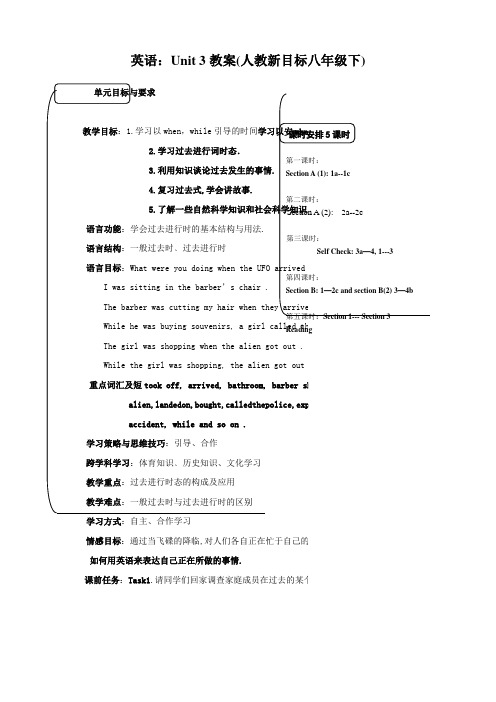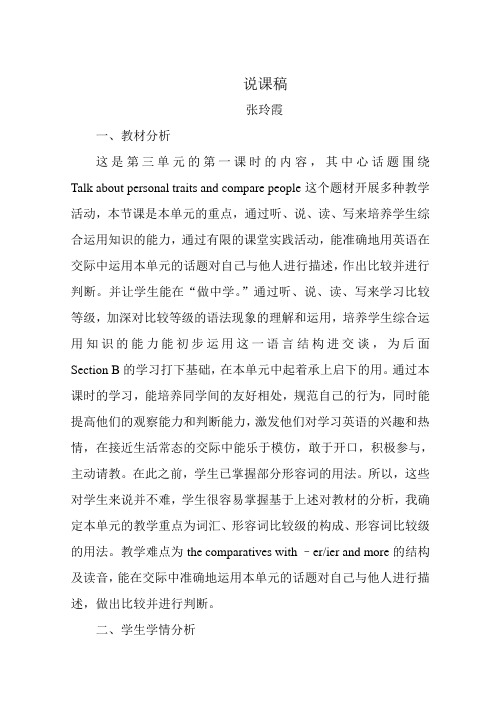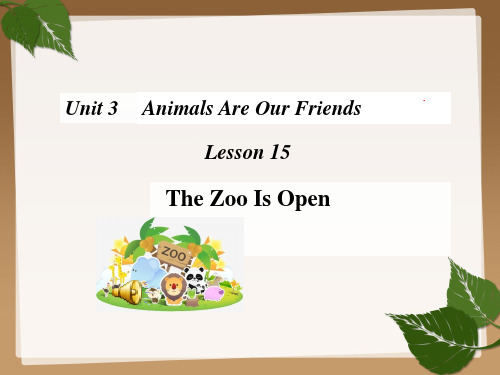2014人教版八年级英语下册unit3 优质课
- 格式:ppt
- 大小:3.64 MB
- 文档页数:32

英语:Unit 3教案(人教新目标八年级下)学习方式:自主、合作学习情感目标:通过当飞碟的降临,对人们各自正在忙于自己的事如何用英语来表达自己正在所做的事情.课前任务:Task1.请同学们回家调查家庭成员在过去的某个时第一课时教学内容与分析教学内容:Section A (1): 1a---1c教学目标:1.能够掌握基本单词和词汇。
2.学会过去进行时的基本结构与用法。
3.能够运用以when 引导的时间状语从句。
4.能够运用基本句型进行提问。
学习任务:我的爱好目的:通过学生小组活动,调查在过去的不同时间里做不同的事情,学会使用过去进行时态,培养学生应用英语进行交际的能力。
语言技能:Listening .Speaking .Reading ﹑Writing语言知识:过去进行时的用法及复习一般过去时态提示词语及句型:got out, cut, barber shop, bathroom, kitchen, well, bathroomWhat were you doing when the UFO arrived ?I was sitting in the barber’s chair .The barber was cuttingmyhair when they arrived .教学重点、难点分析:教学重点:基本单词,词汇和句型教学难点:能够运用过去进行时谈论人们所做的事情.课前准备1.本课时的教学课件2.课前发给学生表格向学生布置任务:在表格中写出有关内容。
教学设计教学步骤建议和说明Teaching Steps :Step 1 :Warm-up and revision1.Share an English song .2.Greetings and free-talk .从平常的谈话中轻松导入本课句型,信息沟通使谈话非常真实,而又浅显What are you doing ? What did you do last night ?3.Show slides: Revise: is/an/are +动词ing4.Brain storm:Collect the names of activities which said by the students.Step 2 :Presentation :1.Watch a video2.By asking: What’s this in English ?Have you even seen it ?3.Teach:UFO, bedroom, bathroom, bedroom, kitchen,living-room, barber shopStep 3 :Work on:SB Page 18 , 1a .1.Point to the sentences .Read the sentences .Explain what each one means.2.Teach :barber shop, well, bathroom, bedroom, kitchen, get out, cut3.Look at the picture.. Point out the six people. Match the statements with the people in the picture4.Check the answers .5.Practice reading .Step 4 :Work on:SB Page 18 , 1b .1. Read the instructions .Make sure the Ss understand whatthey should do .2. Look at the dialogue in the picture .Explain :过去进行时态的构成: was / were + doing .用法:表示过去某一时刻或某一段时间正在进行的动作,一般用时间状语来表示。


说课稿张玲霞一、教材分析这是第三单元的第一课时的内容,其中心话题围绕Talk about personal traits and compare people这个题材开展多种教学活动,本节课是本单元的重点,通过听、说、读、写来培养学生综合运用知识的能力,通过有限的课堂实践活动,能准确地用英语在交际中运用本单元的话题对自己与他人进行描述,作出比较并进行判断。
并让学生能在“做中学。
”通过听、说、读、写来学习比较等级,加深对比较等级的语法现象的理解和运用,培养学生综合运用知识的能力能初步运用这一语言结构进交谈,为后面Section B 的学习打下基础,在本单元中起着承上启下的用。
通过本课时的学习,能培养同学间的友好相处,规范自己的行为,同时能提高他们的观察能力和判断能力,激发他们对学习英语的兴趣和热情,在接近生活常态的交际中能乐于模仿,敢于开口,积极参与,主动请教。
在此之前,学生已掌握部分形容词的用法。
所以,这些对学生来说并不难,学生很容易掌握基于上述对教材的分析,我确定本单元的教学重点为词汇、形容词比较级的构成、形容词比较级的用法。
教学难点为the comparatives with –er/ier and more 的结构及读音,能在交际中准确地运用本单元的话题对自己与他人进行描述,做出比较并进行判断。
二、学生学情分析我们教学的对象是初二学生(以中等生为主),他们学习英语有较强的记忆力和模仿能力,有待培养知识的扩展运用能力。
有较强的求知欲和表现欲,但部分学生存在不自信,羞于表现等思想顾虑,但又希望能得到他人的肯定。
因此我在教学活动中尽量让他们参与到活动中来,有更多的机会来说英语,减少他们的恐惧感,由于缺少丰富的语言基础,对某些任务的完成有一定的难度,通过学生间的合作学习,降低他们的学习难度,使他们体验到成功的喜悦。
新教材重视以人为本,学生的发展是英语课程的出发点和归宿。
根据学生实际情况,对知识的增、减、删做细心研究,尊重学生现有的知识水平和认识差异,着眼学生的个性发展,把握整体目标走向,因此,本课中我挑选了section A:1a,1b,1c等内容。



Unit3 SectionA(1a-2d)名师教案1.0Teaching Analysis教情分析1.1Teaching Objectives 教学目标1.1.1Language goals 语言目标1.1.1.1 Key Words and Chunks1.1.1.1.1 For applying: do the dishes, make the bed, take out the rubbish, foldthe clothes, sweep the floor, clean the living room, no problem, goout for dinner, go to the movies, stay out late, get a ride, have to, need,work on, help out with, at least, finish, any minute now1.1.1.1.2 For comprehending: stay out late, get a ride, have to, need, workon, help out with, at least, finish, any minute now1.1.1.3 Sentence Structures1)Could you please take out the rubbish?Sure. / Sorry, I can’t. I have to finish homework first.2) Could I use your computer?Sorry. I'm going to work on it now.3)Well, could I watch TV?Yes, you can. But first you have to clean your room.4)A nd she won’t be happy if she sees this mess.5) Could I at least finish watching this show?6)I think two hours of TV is enough for you .1.1.1.4Grammar Focus1)C ould for polite requestsA:Could you please take out the rubbish?B:OK, but I want to watch one show first.A:Could you please take out the rubbish?B:Yes, sure.2)C ould for permissionA:Could I go out for dinner with my friends?B:Sure, that should be OK.A:Could you get something to drink after the movie?B:No, you can’t. You have a basketball game to morrow.1.1.2Ability goals 能力目标1.1.2.1 教会学生用could礼貌地提出要求和征求许可。
Section A 单词rubbish n.垃圾;废弃物fold v.折叠;对折sweep v.(swept)扫;打扫floor n.地板mess n.杂乱;不整洁throw v.(threw)扔;掷neither adv.也不; pron.两者都不shirt n.衬衫pass v.给;递;走过;通过borrow v.借;借用lend v.(lent)借给;借出finger n.手指hate v.厌恶;讨厌while conj.与……同时;当……的时候;而;然而chore n.杂务;乏味无聊的工作snack n.点心;小吃;快餐短语take out the rubbish 倒垃圾all the time频繁;反复as soon as 一……就……句型1.Peter,could you please take out the rubbish? 彼得,你能把垃圾倒了吗?2.And she won’t be happy if she sees this mess.而且如果她看到这么乱,她会不高兴的。
3.Could I at least finish watching this show?至少等我看完这个节目可以吗?4.For one week, she did not do any housework and neither did I.在—周时间里,她没有做任何家务,我也没有做。
that everyone should do their part in keeping it clean and tidy.既然他们和父母生活在同一所房子里,他们就应该知道每个人都应该为保持房屋的干净和整洁尽一份力。
5.The earlier kids learn to be independent,the better it is for theirfuture.孩子们越早学会独立,对他们的未来就越好。
语法情态动词could的用法掌握本单元中的重点词汇及相关短语,并灵活运用。
⼈教版⼋年级英语下册:Unit3Couldyoupleasecleanyourroom教案⼈教版⼋年级英语下册Unit 3 Could you please clean your room?New words and phrasesTeaching and Learning Goals:⼀、语⾔知识和语⾔技能:1. 能争取使⽤下列词汇(Curriculum words)rubbish, fold, dish, sweep, trash, fold, mess, neither, shirt, pass, borrow, lend, finger, hate , while, stress, waste, snack, provide, anyway, depend , develop, fairness, since, neighbor, ill, drop, , fair, unfair2.争取在具体情景下学会使⽤下列常⽤短语进⾏英语表达。
(Useful expressions)do the dishes, make the bed, take out the rubbish, fold the clothes, sweep the floor, clean the living room ,take care of,depend on, in order to, as soon as3. 能认读下列词汇:( Non-curriculum words)Independent,independence, chore,4.理解、翻译并复述运⽤本节课的新词汇所编写的故事,利⽤故事记忆单词。
⼆、学习策略:1. 依据图⽚理解和记忆词汇。
(Understand and remember the words and phrases with the help of the pictures.)2. 在语境中理解和记忆词汇。